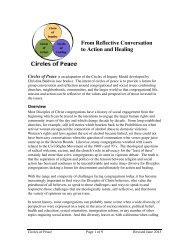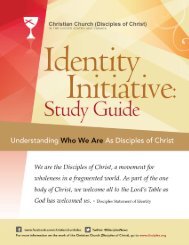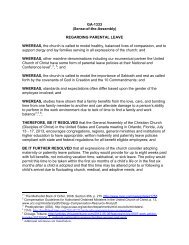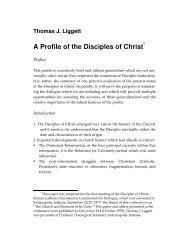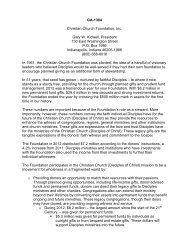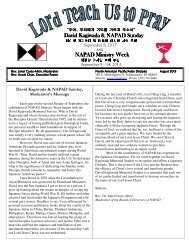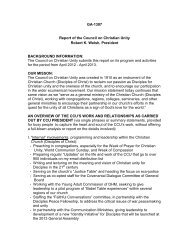RESOURCING THE CHURCH FOR ECUMENICAL MINISTRy A ...
RESOURCING THE CHURCH FOR ECUMENICAL MINISTRy A ...
RESOURCING THE CHURCH FOR ECUMENICAL MINISTRy A ...
Create successful ePaper yourself
Turn your PDF publications into a flip-book with our unique Google optimized e-Paper software.
olstering old forms of domination unless constantly<br />
coupled with a commitment to just relationship.<br />
The unity we have in Christ is one in which<br />
those who have been marginalized find a home. On<br />
the other hand, the justice we seek is not merely the<br />
coexistence of separated communities, but a new<br />
community in which those who were estranged or<br />
marginalized now live together.<br />
Both groups think they are the heart<br />
of ecumenism—and there is almost<br />
no overlap between them.<br />
Needless to say, this tension between unity and<br />
justice is difficult to maintain—to the point that<br />
today the ecumenical movement is itself in great<br />
danger of fragmenting. A good example comes every<br />
Spring. In March, several hundred persons gather<br />
in Washington DC for Ecumenical Advocacy Days<br />
in order to bear common witness interdenominationally<br />
on issues of justice and peace. Then, in<br />
April, several hundred persons gather somewhere<br />
in the country for the National Workshop on<br />
Christian Unity in order to reflect on theological<br />
dialogues aimed at advancing the goal of eucharistic<br />
communion. Both groups, I know from experience,<br />
think they are the heart of ecumenism—and<br />
there is almost no overlap between them.<br />
Of course, Disciples history also demonstrates the<br />
difficulty of holding this tension. To use an obvious<br />
example, Alexander Campbell took a vigorous stand<br />
against slavery in the early 1830s, but moderated his<br />
posture a decade later out of a desire to preserve<br />
church unity. In the same way, Campbell was an<br />
outspoken pacifist—in times of peace. But during the<br />
Mexican war of 1846 he refrained from calling for an<br />
end to the violence lest such a call prove divisive for<br />
Disciples fellowship. The contemporary ecumenical<br />
emphasis on justice only increases the challenge.<br />
Interfaith Relations and Unity<br />
There is, in this era, and evident and increasing<br />
appreciation for the importance of interfaith<br />
relations. Again, I trust we affirm that this is good<br />
news, for reasons that will undoubtedly be discussed<br />
later in this conference. The danger,<br />
however, is that interfaith will be seen as an<br />
alternative to ecumenical—and that, in my judgment,<br />
is disastrous.<br />
Kinnamon • A Century of Witness, a Journey of Wholeness<br />
6<br />
Once more, I need to say this clearly to avoid<br />
misunderstandings. Dialogue and cooperation with<br />
people of other religious faiths belong on the<br />
ecumenical agenda for several obvious reasons:<br />
a. A movement concerned with the problems<br />
and future of the oikoumene (the whole world)<br />
will surely want to pursue peace or justice or<br />
ecological responsibility alongside neighbors<br />
of other faiths. The issues of this world are too<br />
large to be dealt with by Christians alone.<br />
b. Interfaith dialogue is something that the<br />
churches properly do together. It makes little<br />
sense to talk about Disciples-Buddhist<br />
dialogue!<br />
c. The question of the place of other religions in<br />
God’s plan of salvation is still one that<br />
generates great controversy within<br />
Christianity and, therefore, must be on the<br />
agenda of a movement concerned with<br />
overcoming divisions within the church.<br />
At the same time, ecumenism and interfaith<br />
relations should not be confused or collapsed<br />
because they have different goals, reflecting<br />
different theological foundations. Ecumenism<br />
seeks to make visible the communion, the intensity<br />
of shared life, that Christians have with one<br />
another through Christ. Interfaith relations also<br />
have a compelling theological foundation: humanity’s<br />
common creation in the image of God.<br />
The goal, however, is not koinonia, but cooperative<br />
partnership on behalf of the human future.<br />
My point is not that one is “better” than the other,<br />
but that they are different—and that we need both.<br />
If I am not mistaken, however, many people in our<br />
churches now regard the search for Christian unity<br />
as passé, even exclusivist, seeing interfaith relations<br />
as the more significant (and more exotic)<br />
alternative. Others apparently think that moving<br />
from Christian-Christian to, say, Christian-<br />
Muslim dialogue is simply a matter of expanding the<br />
circle.<br />
I will add, although it almost goes without saying, that<br />
it is easier to relate to open-minded Jews or Muslims<br />
or Buddhists or Hindus than it is to relate to many of<br />
the narrow-minded jerks who insist on calling<br />
themselves Christian! Work for Christian unity is<br />
often harder than interfaith work. And it will be a real<br />
challenge not to minimize (or give up on) the one in<br />
order to concentrate solely on the other.



